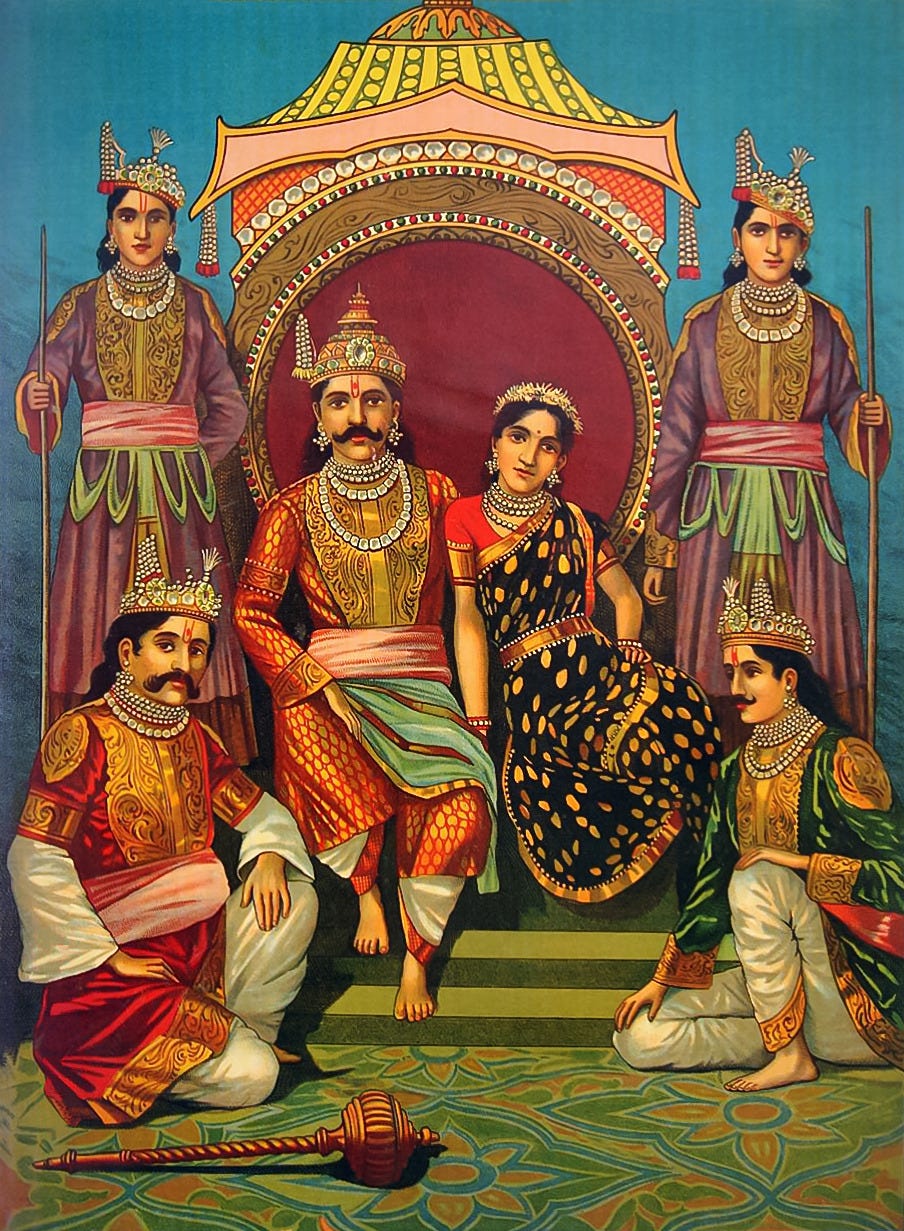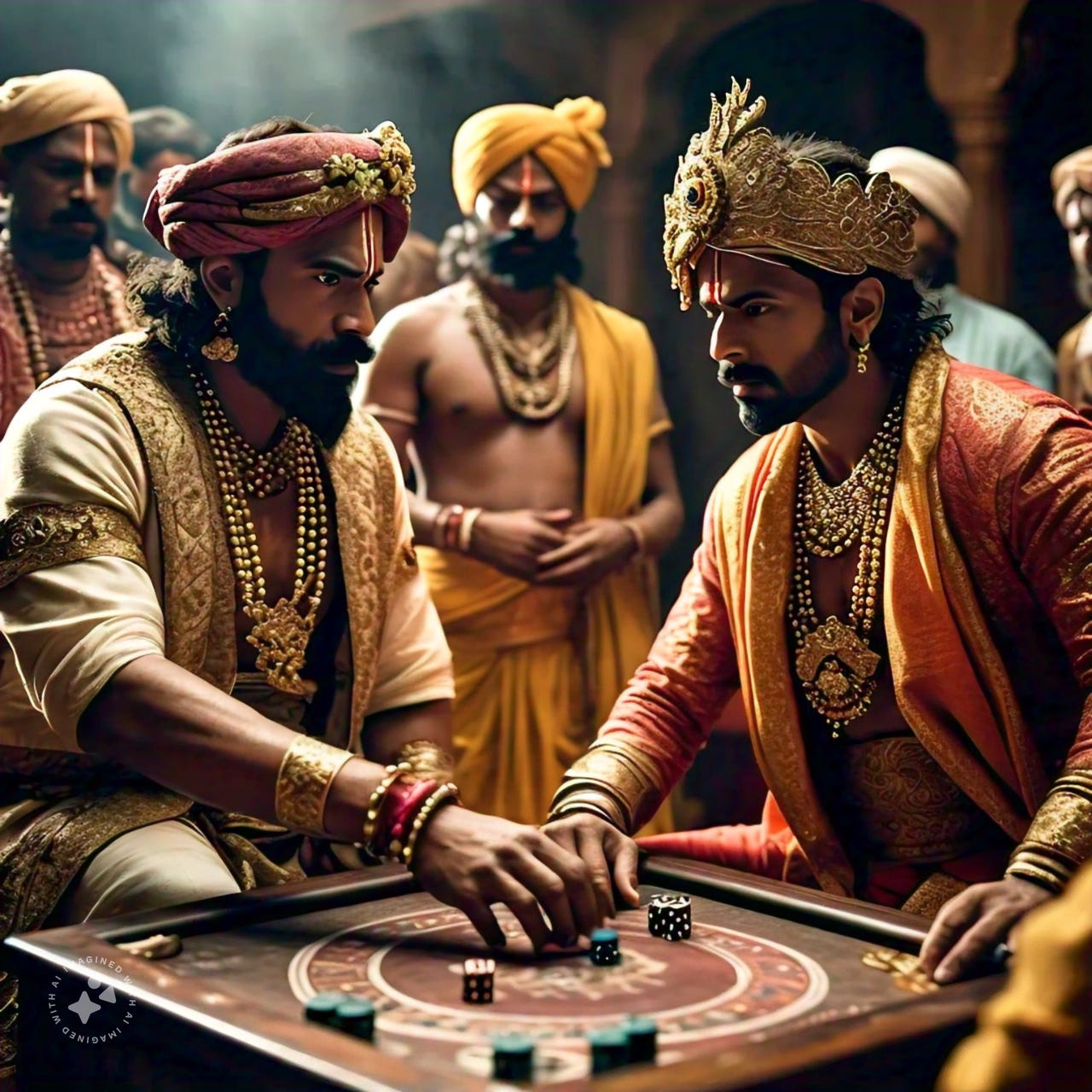The translator’s division of the Mahābhārata into ten roughly equal volumes cuts across its standard division into eighteen very unequal “parvas.” The first volume, which I described here, introduced us to the five Pandava brothers. Arjuna, the brother who understands weapons the best, wins the princess Droupadi in an archery contest, but because his mother mistakenly thinks he has won some money, she tells him to share the prize equally with his brothers. So, rather than change her instructions, all five of the brothers marry Droupadi.
At the start of the second volume, the brothers receive some advice on how to avoid conflicts over Droupadi: The brothers should agree that no brother can interrupt when another one sleeps with Droupadi. If that happens, then the intruder must go and live in the forest for twelve years. So, of course, Arjuna, while chasing a bandit, accidentally walks in on Yudhishthira and Droupadi. Yudhishthira says no harm done, but Arjuna insists that he must abide by the rules they have all agreed to live by.
Arjuna goes to a forest and has a bunch of adventures before coming back. The first parva ends with a very odd story. Someone who looks like a brahmin shows up and asks for some food. Yudhishthira agrees, and then the fake brahmin reveals himself as none other than Agni, the fire god, who likes to eat entire forests for breakfast. So Agni and the Pandava brothers all work together to burn down the forest and prevent any animals from escaping—well, all except for four birds, but that’s another story. Anyway, the rest of the gods want to put out the forest fire with rain, but Agni gives Arjuna a magic bow with an inexhaustible quiver of arrows and Arjuna keeps the clouds at bay. (Magic things often have names, and this magic bow goes by “Gandiva.”) As a reward, Agni lets Arjuna keep Gandiva and the quiver, and he also throws in a chariot and some other stuff.
Along with a bottomless well of stories, this volume contains some fascinating discussions. I especially enjoyed the ones about what constitutes good governance, whether forgiveness sometimes needs to give way to revenge, and why bad things happen to good people.
I’ll start with governance. A sage visits Yudhishthira and interrogates him thoroughly.
Is your wealth spent properly? Does your mind find pleasure in dharma? Do you find happiness without making your mind suffer? […] You have surely not become a slave to sleep and you are awake at the appropriate time. In the dead of night, do you think about what should be done and what should not? […] Do you use groups of three spies, who do not know one another, to find out about the eighteen ministers on the other side and the fifteen on your own territory? […] When attacking the enemy in battle, surely you do not kill during seasons of sowing and harvesting. […] Do you comfort and protect the women? But surely you do not trust them, nor reveal any secrets before them. […] In punishing those who deserve it and honoring those who deserve it, do you act like Yama, impartial between those you like and those you do not like? […] Corrupted by bribes, do your advisers see falsely when disputes arise between the poor and the rich? […] Do you nurture like a father the blind, the dumb, the crippled, the deformed, the orphaned and mendicant ascetics?
The interrogation goes on for several pages, but it seems to me to revolve around five basic topics: (1) Self-control or temperance; (2) A good will (doing the right thing simply because); (3) The just and fair treatment of one’s subjects; (4) Seeking good advice and listening to reason; (5) Preparing against adversities, not only the expected ones but also the unexpected. This discussion takes place at an important moment. Yudhishthira has gained a kingdom, and his reputation as a good ruler has begun to spread. Others now urge him to expand his good rule over a greater area, but he worries about his own motivations. So this checklist helps him assess whether the plan to build an empire comes from an urge to do the right thing or from greed and vanity.
Shortly after this discussion, Yudhishthira gathers the surrounding independent kingdoms into a single empire by gaining the allegiance of all the kings through negotiation or, in some cases, through old-fashioned conquest. He arranges for a great ceremony in which all will acknowledge him as their lord. This ceremony takes place, with kings from all over bringing fabulous tributes. Not surprisingly, some people do not rejoice to see Yudhishthira amassing all this wealth. Duryodhana, the leader of the Kourava clan, grows quite envious. He knows he can’t defeat Yudhishthira in a fair fight, so he takes advantage of Yudhishthira’s greatest weakness, an addiction to gambling. He engages a dice hustler, Shakuni, to play against Yudhishthira. Repeated losses only spur Yudhishthira to gamble more, despite everyone around him urging him to stop.
In the end, Duryodhana gets control of the whole empire, but under some odd conditions. He gets to rule the empire for twelve years. During those twelve years the Pandavas must live in a forest (not the one that got burned down) and forage for their food. At the end of twelve years, the Pandavas may come back to civilization, but they have to do so without anyone recognizing them. If detected, they have to go back to the forest for another twelve years. If they meet these conditions, they finally get their empire back again. Thus, a sword hangs over Duryodhana’s head. He knows the Pandava brothers will eventually reclaim their empire. But he chooses not to think about it.
In one particularly bad scene at the end of the gambling bout, Duryodhana drags Droupadi out of her home and parades her in front of everyone watching the gambling. Much later, during the time of banishment in the forest, Droupadi won’t let Yudhishthira (or her other husbands) forget how none of them lifted a finger to help her when Duryodhana humiliated her. This leads to a wonderful discussion of forgiveness.
It seems to me that many people in the Mahābhārata let promises, curses, and rules take priority over self-interest. Even in cases where someone could easily get away with breaking their word, they never do. Curses never get dissolved, orders never get rescinded, threats or promises never get abandoned, despite legitimate excuses for doing so. In the case at hand, Yudhishthira honors his gambling debts, even when everyone knows that Shakuni won by cheating. Droupadi doesn’t understand this absolutist attitude about rules, and she certainly doesn’t appreciate Yudhishthira’s willingness to stick to his end of the bargain when it results in her own humiliation and banishment. She knows that if Yudhishthira keeps following dharma he will have to forgive Duryodhana, so she tries to head things off.
It is certain there is no anger left in you. Despite seeing your brothers and me, your mind is not miserable. But the sacred texts say there is no kshatriya in the world without anger.
A kshatriya belongs to the warrior caste, who like the guardians in Plato’s Republic, protect society by fighting in wartime and governing in peacetime. Yudhishthira belongs to this caste, but he sometimes seems to fancy himself a member of the brahmin caste of sages and holy men. She continues.
But in you, today, I see that which is contrary to kshatriyas. […] A kshatriya who does not display his energy when the time is right is always despised by all beings. Therefore, under no circumstances should you show any forgiveness towards your enemies. There is no doubt that you are capable of destroying all of them through your energy.
She concedes that a kshatriya must also forgive “when the time for forgiveness arrives,” but she goes into some detail as to why the time for forgiving Duryodhana has not arrived; she further insists that someone who always forgives gets no respect from either his servants or his acquaintances. In short, she insists, “to be ignored in this world is worse than death.”
Yudhishthira responds with an essay worthy of Seneca on the dangers of anger, starting with the observation that “anger is the root of destruction for all beings.” Essentially, he says that anger clouds judgment, weakens a person, and tricks them into believing they have become stronger. He concludes that he will indeed forgive Duryodhana and approach him in peace upon fulfilling the terms of the banishment, trusting him to return the kingdom to Yudhishthira. “If he does not, he will face destruction.”
Frustrated, Droupadi then launches into a damning attack on dharma itself, raising the question of why one should act rightly when bad things happen to good people.
The illustrious one [i.e., the creator] plays with all beings, like a child with his toys. O king! The creator does not act toward beings like a father or a mother. Like an inferior person, he seems to be driven by rage.
My thoughts are agitated when I see that those who are good, righteous and modest suffer in their conduct, while evil ones are happy. […] If the evil that is done does not taint the performer, then strength alone is the cause of everything and I grieve for those who are weak.
Yudhishthira then responds.
We have heard the words that you have spoken. They are sweet, well crafted and full of good expressions. But what you have said is atheism. O princess! I do not follow dharma because of its fruits. I give what should be given. I sacrifice what should be sacrificed. O Krishna! Without bothering about whether there is fruit or not, and to the best of my abilities, I do what a man who is a householder is supposed to do.
He explains that one must trust that the next life will reward those who follow dharma, but one should expect those rewards without following dharma because of them.
Obviously, the Mahābhārata contains something for everyone, from fantasy quests to meaning-of-life reveries.
Tomorrow, a reading group to which I belong will discuss Toni Morrison’s Beloved, so I hope to have some thoughts about that work to share in my next post.
I appreciate your interest in this project, and your subscription means a lot to me. If you enjoy these posts from the Decade Project, please share with friends.






When I got to that atheism line in the book I literally laughed out loud! One of my favorite passages in the whole book. Great summary :)